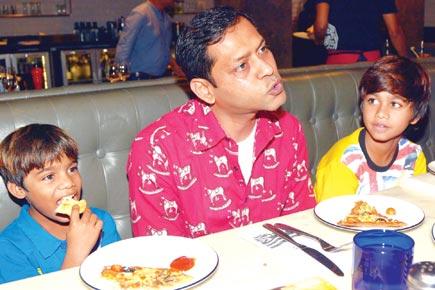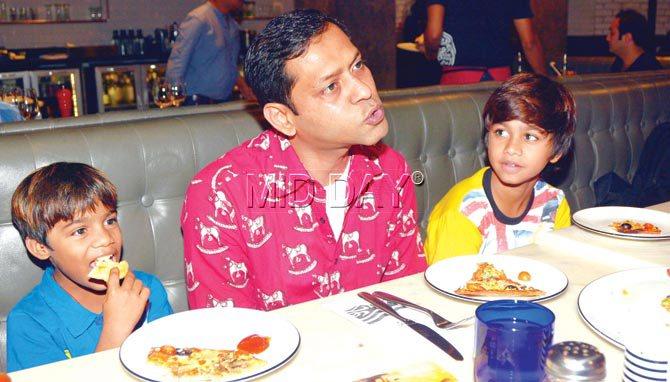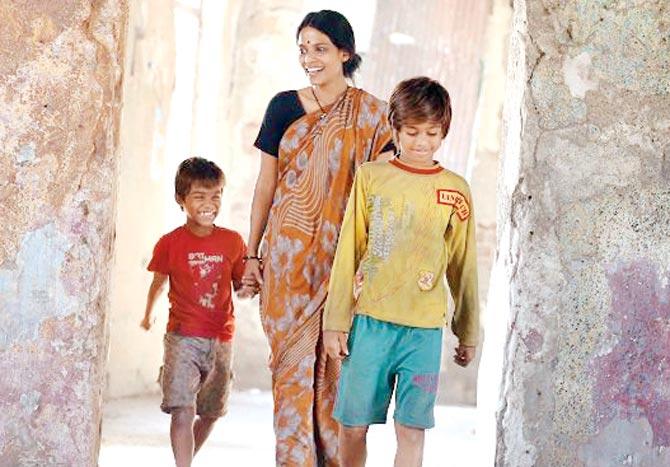Half Ticket is about two slum kids desiring to eat at a fancy pizza place. The pizza stands for a better life, says director Samit Kakkad

(Left) Vinayak Potdar, Shubham More and Samit Kakkad. Pic/Sayyed Sameer Abedi
 Vinayak Potdar and Shubham More, the stars of Marathi film Half Ticket, can't stop beaming as they tuck into a hot veggie pizza at an international pizza chain in Andheri West. Unlike their characters in the film, nobody stops them at the door or asks them why they are there.
Vinayak Potdar and Shubham More, the stars of Marathi film Half Ticket, can't stop beaming as they tuck into a hot veggie pizza at an international pizza chain in Andheri West. Unlike their characters in the film, nobody stops them at the door or asks them why they are there.
ADVERTISEMENT

(Left) Vinayak Potdar, Shubham More and Samit Kakkad. Pic/Sayyed Sameer Abedi
"The film is about two children who desire to eat at the new pizza shop in their neighbourhood," says director Samit Kakkad, who last directed Aayna Ka Bayna (Delinquent Dancers), which was selected at 18 International film festivals representing India. "Such simple desires can be described in any language, because these are universal."
Half Ticket, which is the official Marathi remake of National Award-winning Tamil film, Kakka Muttai, releases all over Maharashtra on July 22. The original, which was produced by Dhanush and Fox Star Studios, is being produced in Marathi by Fox Star and Video Palace.
It tells a simple story, set against the backdrop of Mumbai's slums. Two brothers, only known as chhota kavlacha anda and motha kavlacha anda (a small crow egg and a big crow egg), collect coal that has fallen from train wagons on to the railway tracks and sell it to make a living.

A still from Half Ticket
But, suddenly, their desire to eat pizza at a fancy restaurant takes over their lives and they plan to take matters into their own hands. Being shot not in Dharavi, but in the slums of Darukhana and Kolabunder, which are close to the sea and are old ship dockyards, gives the movie its unique flavour, says Kakkad. "I knew that we had to showcase a part of Mumbai that hadn't been seen before. These slums are very different as they are near the sea."
But first, he had to pick the two children who could absolutely fit the part and that proved to be a problem. "I auditioned almost 500 children but just wasn't getting the right feel. And, then I met these two." Fourteen-year-old, More, who also plays a young Shah Rukh Khan in the upcoming, Raees, bowled Kakkad over with a single dialogue from the film — "Koi dhanda chhota nahin hota, aur dhande se bada koi dharam nahin hota". And, the 11-year-old Potdar did an impersonation in Marathi, that was full of swagger.
"There is a dialogue in the movie where he tells his elder brother 'dada hum log bahut paisa kamayenge, aur mummy ko denge'. I knew then that I had found my chhota kavlacha anda," says Kakkad.
Kakkad spent days on end, sometimes eight hours at a stretch, in the slums of Mumbai with the children. "We really enjoyed that part, as we saw all of Mumbai," says More, who wants to grow up to be an actor. While Potdar, who still wants to be a computer engineer when he grows up, says, "I just followed sir's directions. When he asked me to be happy, I was happy. When he asked me to be sad, I was sad."
But, Kakkad had an easy way to get the best out of the boys. He would only give them the dialogues on the day of the shoot and then, tell them the emotion they needed to deliver their lines with. "Sometimes I even said 'just say your lines the way you want to'. Most scenes were just shot in one take. They are that good," says Kakkad.
As they had spent enough time in the slums and with each other, the chemistry between the boys came easy. "Once I slapped Vinayak because I got irritated with him. But, five days later, as we shot a scene, we were friends again. Now, we are thick pals," says More, as Potdar laughs and hides his face. "Also, they had spent so much time in the slums that they developed a bond with the people there too, and hence, it was easier to shoot."
The takeaway from the movie, Kakkad says, is the fact that it's a happy tale of hope about two children trying to make all their dreams come true. In a way, that pizza stands for a better life — an entry to an exclusive club. "Children are the same everywhere, and so are their emotions. Be it slum kids, or kids from well-to-do families, or people like you and me, it's all about simple desires. What we need is just the drive to make them come true."
 Subscribe today by clicking the link and stay updated with the latest news!" Click here!
Subscribe today by clicking the link and stay updated with the latest news!" Click here!






